An Agile business is able to adapt quickly to changes in the market and uses its resources with maximum efficiency. While Agile is most popular with software development teams, it can be beneficial to other organizations and departments.
An Agile certification allows project managers to develop the skills to use Agile philosophy in their work. There is no shortage of project management certifications on the market. However, Agile certifications are a bit limited. To help you narrow your search, we have rounded up the best Agile project management certifications for 2024.
PMI Agile Certified Practitioner (PMI-ACP): Best for experienced project managers
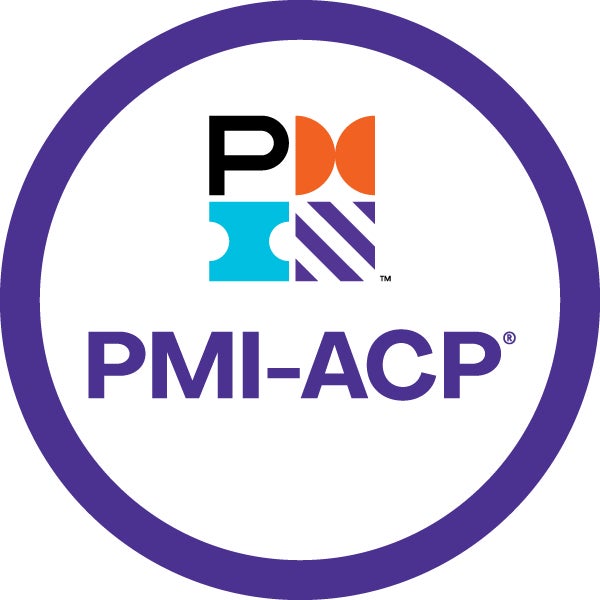
The PMI Agile Certified Practitioner certification is ideal for project managers with Agile experience and want to take their career to the next level. This certification is designed to help project managers become more efficient in Agile methods such as Kanban, Lean and Scrum.
Cost of training and exam
- PMI Member: $435.00
- Nonmember: $495.00
Required skills
To qualify for the PMI Agile Certified Practitioner certification, participants must have:
- Secondary degree.
- Eight months of Agile project management experience in the last three years.
- Twelve months of general project management experience in the last five years. If you have a PMP or PgMP certification, you don’t need to show project management experience.
- Twenty-one contact hours of training in Agile methods.
Key skills taught
- Agile framework and terminology.
- Agile project accounting principles.
- Applying new Agile practices.
- Control limits for Agile projects.
- Regulatory and organizational compliance.
Key differentiators
- Global recognition.
- Deep understanding of Agile approaches.
- Higher salary boost compared to other Agile certifications.
Duration of training and exam
To earn the PMI Agile Certified Practitioner certification, participants must answer 120 multiple-choice questions in three hours.
AgilePM Foundation — APMG: Best for aspiring Agile leaders
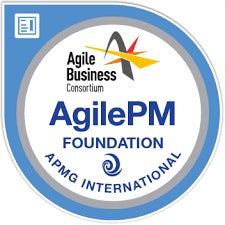
The AgilePM Foundation certification — APMG — is designed for current project managers, but it’s most suited for Agile team members who are aspiring to become leaders or managers. With this certification, you will learn a complete range of Agile methodologies ranging from basic to advanced.
Cost of training and exam
The cost for training and the exam for the AgilePM Foundation certification is $515.
Required skills
AgilePM Foundation has no prerequisites. The candidates must complete pre-course reading.
Key skills taught
- Assign the right Agile technique to the scenario.
- Managing Agile projects.
- Agile governance.
- Measure progress across projects.
Key differentiators
- Ideal step up for Agile team members to become Agile project managers.
- Deep knowledge of the Agile project management methodology.
Duration of training and exam
The training course for the AgilePM Foundation certification is five days. Once completed, participants can take the certification exam, which will require them to complete 50 multiple-choice questions in 40 minutes.
ICAgile Certified Professional (ICP): Best for professionals new to Agile
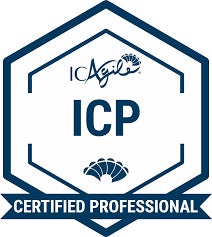
The ICAgile Certified Professional certification is a widely recognized Agile certification that demonstrates a thorough understanding of Agile mindset, principles and values. Rather than focusing on a single Agile methodology, ICP helps project managers develop a well-rounded focus on several Agile frameworks, including SAFe, DSDM, Scrum and Kanban.
Cost of training and exam
Pricing starts at around $700, including ICP certification.
Required skills
No prerequisites are required for the ICP. However, participants are encouraged to have a decent working knowledge of the Agile framework.
Key skills taught
- Principles of Agile and Scrum.
- Widely applied frameworks of Agile.
- Using a combination of Agile frameworks and methods.
- Planning and estimation.
Key differentiators
- Focus on developing an Agile mindset.
- Well-rounded understanding of several Agile principles.
- Covers Agile fundamentals.
- Foundation-level certification.
Duration of training and exam
There is no exam for ICP. The certification requires a two-day course by a certified ICAgile instructor.
Certified SAFe Agilist (Scaled Agile):Best for top-level executives and product managers
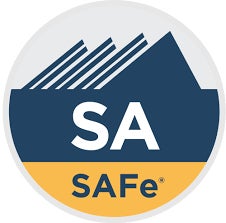
The Certified SAFe Agilist certification is designed for business owners and product managers who want to learn a scaled Agile framework, which is a set of Agile practices at the enterprise level. This certification will help managers learn how to improve product quality, boost team productivity and increase employee engagement.
Certified SAFe Agilist (Scaled Agile) logo.
Cost of training and exam
- Cost of training and exam starts at $599.
- First two exam attempts are free. Exam retake fee is $50
Required skills
To qualify for the Certified SAFe Agilist certification, participants must have:
- Working experience in Scrum.
- Five or more years of work experience in project management, business analysis, software development or product management.
Key skills taught
- Scaled Agile framework.
- Lean-Agile transformations.
- Building an Agile portfolio.
- Business transformation using Agile.
Key differentiators
- Geared towards business owners, top-level executives and product managers.
- Focused on Scaled Agile concepts.
Duration of training and exam
The training period for the Certified SAFe Agilist certification is two days. Participants must then take an exam, which means answering 45 multiple-choice questions in 90 minutes.
Certified ScrumMaster (CSM): Best for professionals leading teams in Scrum framework
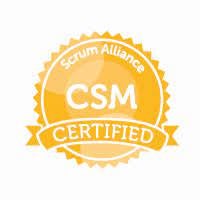
A Scrum master is a professional who leads a team using an Agile project management approach and ensures the team adheres to the Scrum framework. The Certified ScrumMaster certification demonstrates the project management professional’s ability to serve as a coach through the tasks. The certification also helps professionals master the skills to assign and manage tasks in a dynamic environment.
Cost of training and exam
The price for training, exam and certification starts at $599.
Required skills
There are no fixed eligibility requirements for Certified ScrumMaster. However, it’s recommended that participants have a basic understanding of Scrum principles.
Key skills taught
- Scrum life cycle.
- Sprints.
- Agile methodologies.
- Scrum team accountability.
- Scrum terminology.
Key differentiators
- Focus on Scrum framework.
- Works for professionals from several industries.
- Requirement for some Scrum master jobs.
Duration of training and exam
The CSM course is expected to take 16 hours with two days of training. Once the course and training have been completed, participants can take the certification exam.
The duration of the exam is two hours, and it has 50 multiple-choice questions. Participants get two free attempts to pass the CSM test, after which there is a $25 test attempt fee.
Certified Scrum Product Owner (CSPO): Best for Agile product owners
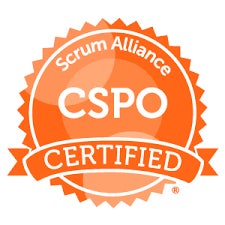
The role of the product owner is to decide what their team will create next to deliver more value to the customer. The Certified Scrum Product Owner certification demonstrates the ability of a product owner to ensure their team stays on target. This certification teaches the principles and framework to manage Scrum teams and how to get the maximum return on investment out of a project.
Cost of training and exam
You can expect to spend around $795 for this certification.
Required skills
There are no eligibility requirements for the Certified Scrum Product Owner.
Key skills taught
- Managing product backlog.
- Hands-on practice in creating product vision.
- Learning new ways to generate value for the product.
Key differentiators
- Designed for existing product owners.
- No exam.
- More advanced compared to the CSM and several other Scrum certifications.
Duration of training and exam
There is no exam to earn the CSPO certification. Instead, participants must take a two-day course that involves around 14 to 16 hours of training.
What are the benefits of Agile project management certifications?
Agile project management certification provides the training, ability and confidence to build and manage efficient teams. It teaches how to deliver value consistently and react and adapt to change with ease. With an enhanced understanding and knowledge of Agile methodologies, project managers can improve project outcomes through better planning and collaboration.
At a personal level, the Agile project management certification helps create greater career opportunities and advanced potential. It also helps boost networking opportunities and provides access to online resources for continued learning and development.
How do I choose the best Agile project management certification?
Using an Agile project management philosophy offers several benefits, as highlighted above. You need certified Agile project managers to implement agility in your organization. Fortunately, there are several certifications to choose from. You can get advanced certification from experienced project managers, who want to take their skills to the next level or you can get more foundational courses that help aspiring Agile leaders develop their skills.
Along with the level of expertise or experience, you will have to consider what type of skills you want to learn and demonstrate through the certification. For example, if you are a product manager wanting to adopt Agile project management into your work, you should focus on certifications geared towards product management, such as the Certified SAFe Agilist or Certified Scrum Product Owner certification.
Frequently asked questions
What is Agile project manager certification?
An Agile project managers certification will show potential employers and current coworkers that you are well trained in Agile methodologies. Some companies either prefer or require an Agile certification for hiring and promotion, so getting one can open up opportunities for employment. Completing an Agile project manager certification will help you quickly increase your knowledge and skills and become a more effective project manager.
Is Agile better than scrum?
Agile is a project management approach that was originally designed to help software teams respond to change, though it has now become so popular that many types of teams outside of software development use it as well. Meanwhile, Scrum is a specific Agile framework that helps teams complete work sprints at a particular cadence.
Scrum is a good choice for teams that need to ship work quickly and frequently, but that schedule doesn’t necessarily work for all teams. Agile is a more flexible and broad approach that can be tailored to many different teams and work schedules. If you are looking for a more general certification, then Agile might be a better choice than scrum. But if your team already uses a scrum approach, then it may make more sense to get certified in scrum specifically.
What is the best Agile certification for beginners?
Some Agile certifications, such as the PMI Agile Certified Practitioner, have pretty extensive prerequisites, which means they are not suitable for beginners. If you are an Agile beginner and don’t currently have much experience or any certifications in it, we recommend seeking out a certification that doesn’t have such prerequisites. We listed several certifications here that are great fit for beginners, including the Agile Foundation APMG, the ICAgile Certified Professional and the Certified Scrum Master.
Which Agile certification is best?
Which Agile certification is the best fit for you depends on where you are in your career and where you want to work. If you are just starting out in your career, or don’t have any experience in Agile yet, then we recommend seeking out a certification that doesn’t have prerequisites and is targeted towards beginners. If you are more experienced and are looking to improve your chances of a promotion, then you will want to try for a more advanced certification that is designed for people who already have a career in Agile.
You will also want to do some research into what project management approaches your current or future companies use. Some use a more general Agile approach, while others use specific frameworks, such as scrum or kanban. If your company falls into one of the latter categories, you may be better off with a more specific certification as opposed to Agile. Some companies also don’t use Agile at all and instead use a different project management methodology, in which case a non-Agile certification may be more helpful. Check out our list of the best project management certifications for some suggestions.
Which is better: PMP or Agile?
PMP stands for Project Management Professional, which is one of the most popular project management certifications besides Agile. PMP is more prescriptive than Agile, being based on traditional waterfall project management methodologies. Some teams find that PMP works better for them, whereas others prefer the flexibility of an Agile approach.
When choosing between a PMP or Agile certification, we recommend getting certified in the approach that your current or future company uses. While PMP and Agile are both excellent certifications to pursue, they are not interchangeable with one another, so you want to be sure that you pick the most effective one for your team’s needs.
Review methodology
For the best Agile project management certifications for 2024, we wanted to not only offer the best certifications but also provide a variety in the type of certification. To choose the best certification, we looked at multiple factors, including whether the certification is well-recognized across the industry and whether the certification providers are reputable. In addition, we looked at the certification websites to gather information about the learning material, training, exam and cost of each certification.
Ready to put your training and skills to work? Check out our list of the best Agile project management software.


